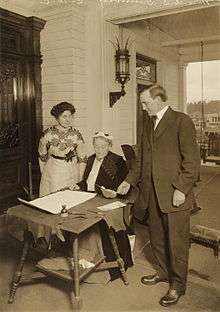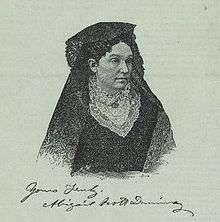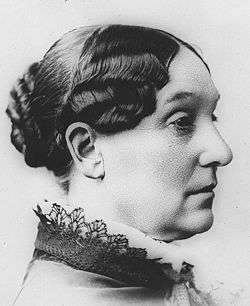Abigail Scott Duniway
| Abigail Scott Duniway | |
|---|---|
|
Duniway between 1870 and 1900 | |
| Born |
Abigail Jane Scott October 22, 1834 farm near Groveland, Illinois |
| Died |
October 11, 1915, at age 80 Portland, Oregon, United States |
| Resting place |
River View Cemetery in Portland 45°27′29″N 122°40′01″W / 45.45806°N 122.66694°W[1] |
| Citizenship | U.S. |
| Known for | Women's suffrage leadership, writing, journalism, pioneer farming |
| Religion | Christian: Presbyterian, then Unitarian |
| Spouse(s) | Benjamin Charles Duniway |
| Children | 6 |
| Parent(s) | John Tucker Scott and Ann (Roelofson) Scott |
| Relatives | Harvey W. Scott, brother |
Abigail Scott Duniway (October 22, 1834 – October 11, 1915) was an American women's rights advocate, newspaper editor and writer, whose efforts were instrumental in gaining voting rights for women.
Biography

Duniway was born Abigail Jane Scott near Groveland, Illinois, to John Tucker Scott and Anne Roelofson Scott. Of the nine children in her family who survived infancy, she was the second. She grew up on the family farm and attended a local school intermittently. In March 1852, against the wishes of Anne, who had concerns about her health, John organized a party of 30 people and 5 ox-drawn wagons to emigrate to Oregon, 2,400 miles (3,900 km) away by trail. Anne died of cholera near Fort Laramie, on the Oregon Trail, in June, and Willie, age 3, the youngest child in the family, died in August along the Burnt River in Oregon. In October, the emigrants reached their destination, Lafayette, in the Willamette Valley. After teaching school in Eola in early 1853, Abigail married Benjamin Charles Duniway, a farmer from Illinois, on August 1. They had six children: Clara Belle (b. 1854), Willis Scott (1856), Hubert (1859), Wilkie Collins (1861), Clyde Augustus (1866), and Ralph Roelofson (1869).[2]
The Duniways farmed in Clackamas County until 1857, when they moved to a farm near Lafayette. They lost this second farm after a friend of Benjamin defaulted on a note endorsed by Benjamin. Soon afterward, Benjamin was permanently disabled in an accident involving a runaway team, and Abigail had to support the family. At first, she opened and ran a small boarding school in Lafayette. In 1866, she moved to Albany where she taught in a private school for a year, then opened a millinery and notions shop, which she ran five years. Angered by stories of injustice and mistreatment relayed to her by married patrons of her shop, and encouraged by Benjamin, she moved to Portland in 1871 to found The New Northwest, a weekly newspaper devoted to women's rights, including suffrage. She published the first issue on May 5, 1871, and continued The New Northwest for 16 years.[2]
Duniway encountered personal setbacks such as poor health, money problems, and opposition from her brother Harvey W. Scott, who also edited a Portland paper, The Oregonian. She persisted despite political opposition in the form of local resistance, the consistent failure of women's suffrage referendums on state ballots, and divisions with Eastern suffrage organizations. She and her newspaper actively supported the Sole Trader Bill and the Married Women's Property Act which, when passed, gave Oregon women the right to own and control property.
Her persistence paid off in 1912 when Oregon became the seventh state in the U.S. to pass a women's suffrage amendment.[3] Governor Oswald West asked her to write and sign the equal suffrage proclamation.[4] She was the first woman to register to vote in Multnomah County.[4]
Duniway is buried at River View Cemetery in Portland.[2]
Publications
Duniway's Captain Gray's Company; or, Crossing the Plains and Living in Oregon (1859), was the first novel to be commercially published in Oregon.[5] This and others that she wrote drew repeatedly on her experiences as a young woman on the Oregon Trail.[5] Her last novel to tell the story was From the West to the West: Across the Plains to Oregon (1905).[5] She wrote a booklet called My Musings after attending a convention of the National Woman Suffrage Association in 1872. Her last publication was Path Breaking: An Autobiographical History of the Equal Suffrage Movement in Pacific Coast States, in 1914.

Works written by Duniway and published by others:[6]
- Captain Gray's Company, or Crossing the Plains and Living in Oregon. Portland, Oregon: S. J. McCormick, 1859.
- David and Anna Matson. New York: S.R. Wells & Co., 1876. OCLC 4826144
- From the West to the West: Across the Plains to Oregon. Chicago: A.C. McClurg, 1905.
- My Musings. Portland, Oregon: Duniway Publishing Co., 1875.
- Path Breaking: An Autobiographical History of the Equal Suffrage Movement in Pacific Coast States, 2nd ed. Portland, Oregon: James, Kerns & Abbott, 1914. Reprint New York: Schocken Books, 1971.
- "The Stage Driver's Story." Phrenological Journal. August 1879, pp. 85–90.
Serialized novels written by Duniway and published in the New Northwest:[6]
- Judith Reid: A Plain Story of a Plain Woman. May 12 – December 22, 1871.
- Ellen Dowd: The Farmer's Wife (in two parts). January 5, 1872 – September 26, 1873.
- Amie and Henry Lee: or, The Spheres of the Sexes. May 29 – November 13, 1874.
- The Happy Home: or, The Husband's Triumph. November 20, 1874 – May 14, 1875.
- One Woman's Sphere, or The Mystery of Eagle Cove. June 4 – December 3, 1875.
- Madge Morrison, The Molalla Maid and Matron. December 10, 1875 – July 28, 1876.
- Edna and John: A Romance of Idaho Flat. September 29, 1876 – June 15, 1877.
- Martha Marblehead: The Maid and Matron of Chehalem. June 29, 1877 – February 8, 1878.
- Her Lot, or How She Was Protected (later revised in manuscript form as Ethel Graeme's Destiny: A Story of Real Life). February 1 – September 19, 1878.
- Fact, Fate and Fancy: or, More Ways of Living Than One. September 26, 1878 – May 15, 1879.
- Mrs. Hardine's Will. November 20, 1879 – August 26, 1880.
- The Mystery of Castle Rock , A Story of the Pacific Northwest. March 2 – September 7, 1882.
- Judge Dunson's Secret, An Oregon Story. March 15 – September 6, 1883.
- Laban McShane, A Frontier Story. January 3 – March 6, 1884.
- Dux: A Maiden Who Dared. September 11, 1884 – March 5, 1885
- The De Launcey Curse: or, The Law of Heredity—A Tale of Three Generations. September 10, 1885 – March 4, 1886.
- Blanche Le Clerq: A Tale of the Mountain Mines. September 2, 1886 – February 24, 1887.
Serialized novels written by Duniway and published in The Pacific Empire:[7]
- Shack-Locks: A Story of the Times. October 3, 1895 – March 26, 1896.
- Bijah's Surprises (later revised in manuscript form as Margaret Rudson, A Pioneer Story. Book one, April 2 – September 26, 1896; Book two, October 1 – December 31, 1896.
- The Old and the New. January 7 – December 30, 1897.
References
Works cited
- Johnson, L.C.; James, Edward T., ed; (1971). "Duniway, Abigail Jane Scott" in Notable American Women: A Biographical Dictionary, Vol. 1, A–F. Cambridge, Massachusetts: The Belknap Press of Harvard University Press. ISBN 0-674-62734-2.
- Moynihan, Ruth Barnes (1983). Rebel for Rights: Abigail Scott Duniway. New Haven, Connecticut: Yale University Press. ISBN 0-300-03478-4.
- Shein, Debra (2002). Abigail Scott Duniway (Western Writers Series No. 151). Boise, Idaho: Boise State University. ISBN 0-88430-151-6.
External links
| Wikimedia Commons has media related to Abigail Scott Duniway. |
- "'She Flies with Her Own Wings': The Collected Speeches of Abigail Scott Duniway (1834-1915)"
- Ward, Jean M. "Abigail Scott Duniway". The Oregon Encyclopedia.
- Biography as a Notable Oregonian, from the Oregon Blue Book
- Image of her tombstone
- Guide to the Abigail Scott Duniway papers at the University of Oregon
- 1912 Women's Suffrage Proclamation Transcription, Oregon Blue Book
- Oregon Experience: Abigail Scott Duniway, OPB video, August 23, 2006. 26:41
